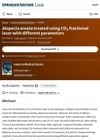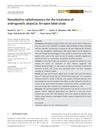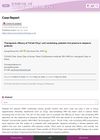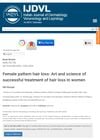 January 2024 in “Dermatologic Therapy”
January 2024 in “Dermatologic Therapy” PRP therapy with specific growth factors improves hair density and thickness in androgenic alopecia.
 January 2025 in “Lasers in Medical Science”
January 2025 in “Lasers in Medical Science” CO2 fractional laser treatment helped regrow hair in a 13-year-old with alopecia areata.
 2 citations,
August 2021 in “Photodiagnosis and Photodynamic Therapy”
2 citations,
August 2021 in “Photodiagnosis and Photodynamic Therapy” Using 5-aminolevulinic acid photodynamic therapy for hair loss didn't increase hair growth but slightly reduced scalp oiliness, and it was safe with mild side effects.
 January 2025 in “Lasers in Medical Science”
January 2025 in “Lasers in Medical Science” Combining fractional CO2 laser with topical dutasteride is more effective for treating male hair loss than using the laser alone.
 11 citations,
May 2021 in “Dermatologic clinics”
11 citations,
May 2021 in “Dermatologic clinics” PRP and cell therapies may help with hair loss, but more research is needed.
20 citations,
October 2021 in “Applied materials today” A new microneedle patch and yellow light therapy significantly promote hair regrowth.
 February 2021 in “Dermatological reviews”
February 2021 in “Dermatological reviews” Nonablative radiofrequency therapy improves hair density, thickness, and growth rate.
 24 citations,
September 2020 in “Dermatology and therapy”
24 citations,
September 2020 in “Dermatology and therapy” Oral minoxidil 5 mg daily increases hair growth safely in men with hair loss, with minor side effects.
January 2025 in “Anais Brasileiros de Dermatologia” Male pattern baldness worsens with age and can be treated with medications like minoxidil and finasteride, but side effects and personalized care are important.
2 citations,
September 2022 in “American Journal of Clinical Dermatology”  32 citations,
March 2020 in “Drug Design Development and Therapy”
32 citations,
March 2020 in “Drug Design Development and Therapy” Finasteride shows promise for female hair loss, but more research needed.
 October 2024 in “Aesthetic Plastic Surgery”
October 2024 in “Aesthetic Plastic Surgery” Micrografts are a safe and effective treatment for hair loss in both men and women.
1 citations,
August 2019 in “Journal of Dentistry Indonesia” A 645-nm diode laser effectively penetrates swine soft tissues, suggesting predictable therapeutic effects.
 1 citations,
March 2019 in “Lasers in Surgery and Medicine”
1 citations,
March 2019 in “Lasers in Surgery and Medicine” The conference reported improvements in muscle volume, skin cancer diagnosis, facial and vaginal rejuvenation, and hair growth using various laser treatments.
 November 2023 in “Heliyon”
November 2023 in “Heliyon” A woman got a serious eye infection after a hair loss treatment due to improper procedure.
 43 citations,
September 2017 in “Lasers in Surgery and Medicine”
43 citations,
September 2017 in “Lasers in Surgery and Medicine” LED light therapy may help hair growth by activating certain cell pathways.
 August 2023 in “Stem Cell Research & Therapy”
August 2023 in “Stem Cell Research & Therapy” A substance called Cell-free fat extract can effectively treat common hair loss by increasing hair growth and density.
 May 2023 in “Current Applied Science and Technology”
May 2023 in “Current Applied Science and Technology” Higher power CO2 laser causes more severe skin burns and damage.
1 citations,
June 2022 in “Photobiomodulation, photomedicine, and laser surgery”  13 citations,
June 2020 in “Journal of Dermatological Treatment”
13 citations,
June 2020 in “Journal of Dermatological Treatment” Topical finasteride helps regrow hair and reduce hair loss in men and women.
 15 citations,
May 2020 in “Journal of Dermatological Treatment”
15 citations,
May 2020 in “Journal of Dermatological Treatment” PRP treatment increases hair density and thickness in androgenetic alopecia by 79%.
 June 2020 in “Journal of cosmetic medicine”
June 2020 in “Journal of cosmetic medicine” TriCell CD34+ cell-containing PRP therapy improves hair thickness and density in alopecia patients without side effects.
January 2019 in “International Journal of Case Reports and Images” Combining microneedling with light therapy increased hair density by 26% in men.
 August 2024 in “Indian Journal of Dermatology Venereology and Leprology”
August 2024 in “Indian Journal of Dermatology Venereology and Leprology” The book provides comprehensive treatment strategies for female hair loss.
 February 2024 in “Cureus”
February 2024 in “Cureus” PRP therapy with minoxidil is more effective for hair growth than PRP alone.
 2 citations,
January 2014 in “Hair transplant forum international”
2 citations,
January 2014 in “Hair transplant forum international” Platelet Rich Plasma (PRP) therapy can improve hair thinning in male pattern baldness patients, but more research is needed to confirm its effectiveness.
 2 citations,
March 2015 in “Expert opinion on orphan drugs”
2 citations,
March 2015 in “Expert opinion on orphan drugs” New treatments for hair loss show promise but need more research to confirm safety and effectiveness.
 April 2023 in “IP Indian journal of clinical and experimental dermatology”
April 2023 in “IP Indian journal of clinical and experimental dermatology” Lichen planus is a chronic autoimmune disease that is hard to treat and more common in women.
 November 2008 in “Medical & surgical dermatology”
November 2008 in “Medical & surgical dermatology” A device was made in 2008 to measure hair loss severity. Other findings include: frizzy mutation in mice isn't related to Fgfr2, C/EBPx marks preadipocytes, Cyclosporin A speeds up hair growth in mice, blocking plasmin and metalloproteinases hinders healing, hyperbaric oxygen helps ischemic wound healing, amniotic membranes heal wounds better than polyurethane foam, rhVEGF165 from a fibrin matrix improves tissue flap viability and induces VEGF-R2 expression, and bFGF enhances wound healing and reduces scarring in rabbits.
 23 citations,
June 2018 in “Facial Plastic Surgery”
23 citations,
June 2018 in “Facial Plastic Surgery” Platelet-Rich Plasma (PRP) is a low-risk treatment for Androgenic Alopecia (AGA) that generally improves hair count or density, but more research is needed for optimization.
























